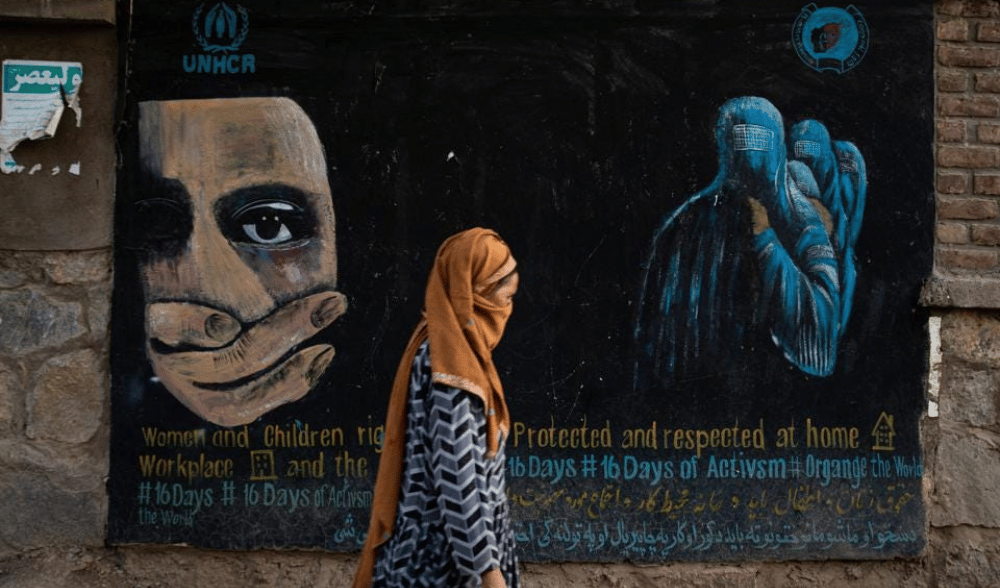ARYANA KHALILZADEH WRITES – One year ago, the world watched images of desperate Afghans clinging to taxiing military planes in hopes of fleeing the Taliban regime at Kabul Airport, or seeing hundreds of desperate Afghan citizens pushing the fences on the tarmac to be flown out of the country. That was then, and now: One year later from August 15th, 2021, the Taliban is celebrating the anniversary of its victory, while many Afghans are desperately searching for ways to regain their freedom and rights to education, healthcare, and work.
The Taliban rose to power thanks to the power vacuum created by the chaotic withdrawal of the United States and its allies from Afghanistan without assuring that the rights of Afghans, in particular Afghan women, are preserved. Its rise to power was not through an election or any democratic process, but rather through sketchy agreements reached at the negotiation table in Doha with the United States and its allies. The widespread fear amongst Afghan women was that once again the Taliban will institute a system of gender apartheid, drastically reducing their basic human rights. At its first press conference since taking control, the Taliban spokesperson, Zabihullah Mujahid, offered assurance that Afghan women will be allowed to work and study. A year later, the Taliban backtracked on their promise and Afghan women are confined to a virtual house arrest; they are even banned from continuing any school past elementary education.
In fact, only Afghanistan bans girls from attending high school. Women in Afghanistan now face some of the harshest gender restrictions anywhere. The Taliban have formed an all-male cabinet with no women in any cabinet post or with any government position. The Afghan Ministry of Women’s Affairs was abolished in September 2021 and replaced by the Ministry of Prayer and Guidance, and the Promotion of Virtues and Prevention of Vice, who are tasked with enforcing strict measures imposed by the Taliban.
The Taliban have issued a decree that women must wear “chadori” which are head-to-toe burqas, and they must cover their faces in public. To further clarify, the Ministry issued a further ‘fashion’ statement, indicating that the blue-colored burqa is the best hijab, but has also indicated that a long black veil covering a woman from head to toe is acceptable as well. According to the description provided by the ministry, any garment covering the body of a woman is considered a hijab, as long as it is not too tight or revealing. According to the Ministry spokesperson, the decree will further punish the relatives of the women who do not cover themselves. Furthermore, their fathers or closest male relatives will be sacked from any government job they hold if the woman is found with improper cover.
Women in Afghanistan have also been ordered home except the case of an emergency. The first act by the regime was to bar women from working in any government office, such as the bank or ministries. Women are also barred from traveling long distance and cannot be offered any transportation unless accompanied by a male chaperon, and there are currently many women imprisoned without trial for the crime of taking a taxi without a male companion, as well as the instruction for airlines to not to board women on international or domestic flights unless accompanied by the male chaperon. The Taliban has also segregated men and women in restaurants and have even banned husbands and wives from sitting and dining together in a restaurant. The segregation order includes many other public places such as public parks, which have been ordered to open on certain days for each sex.
Women have been resisting the Taliban with the motto of “Work, Food, Freedom,” and have been stepping out with their faces uncovered. But their peaceful demonstrations have been broken up time and again with violence by the Taliban security forces; reports of disappearances of female activists are well-founded. The Taliban’s rise to power has crushed the dreams of many Afghan women athletes who have been banned by the Taliban from playing. Under the new Taliban rules, women are banned from appearing in any television drama. The regime has stopped issuing new driver’s license to women, and many believe that this is the first step in banning women from driving vehicles. When seeking healthcare, women are required to be accompanied by a male chaperon, which has a major impact on women’s access to healthcare system. These requirements have placed the lives of many women at risk at the time when people need to be vaccinated against COVID-19.
As the world faces multiple crises around the world, we must not forget the strong women and girls of Afghanistan. While rights have been vilely reduced, the women of Afghanistan have not backed down. They continue to be a powerful social and political force. From organizing protests, to creating businesses and schools, they — in secret, but sometimes not so secret, ways — are resisting.

